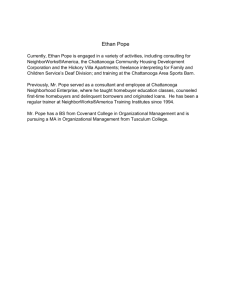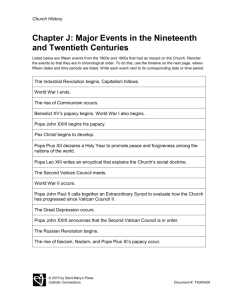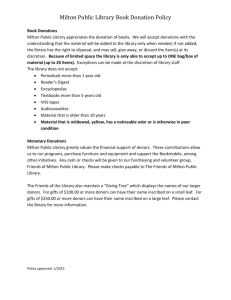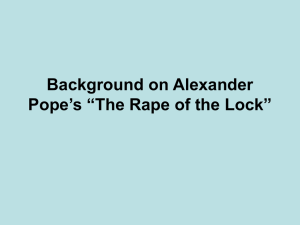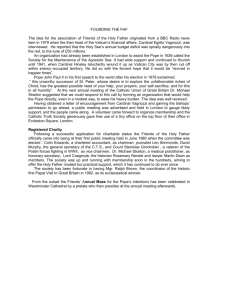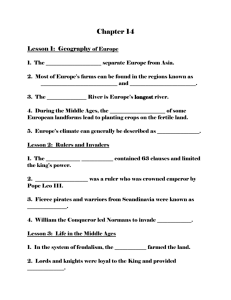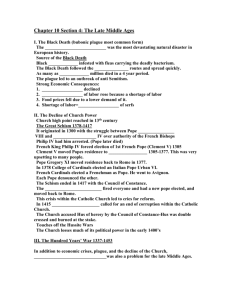Evil? No Problem - Journal of Student Scholarhip
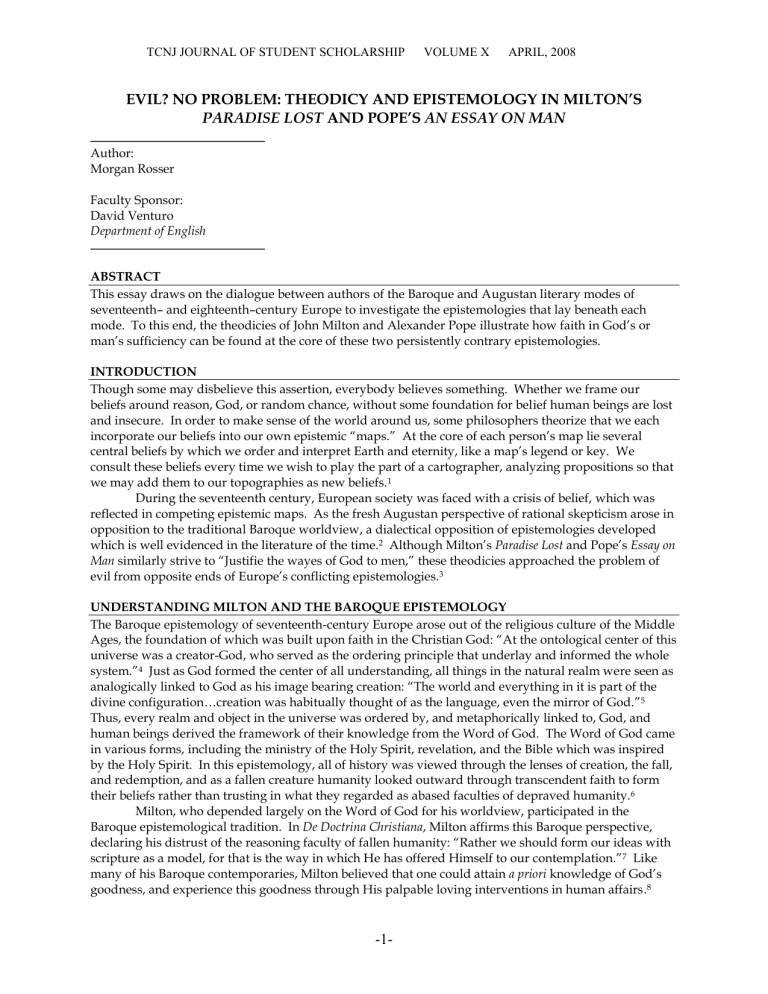
TCNJ JOURNAL OF STUDENT SCHOLARSHIP VOLUME X APRIL, 2008
EVIL? NO PROBLEM: THEODICY AND EPISTEMOLOGY IN MILTON’S
PARADISE LOST AND POPE’S AN ESSAY ON MAN
Author:
Morgan Rosser
Faculty Sponsor:
David Venturo
Department of English
ABSTRACT
This essay draws on the dialogue between authors of the Baroque and Augustan literary modes of seventeenth– and eighteenth–century Europe to investigate the epistemologies that lay beneath each mode. To this end, the theodicies of John Milton and Alexander Pope illustrate how faith in God‘s or man‘s sufficiency can be found at the core of these two persistently contrary epistemologies.
INTRODUCTION
Though some may disbelieve this assertion, everybody believes something. Whether we frame our beliefs around reason, God, or random chance, without some foundation for belief human beings are lost and insecure. In order to make sense of the world around us, some philosophers theorize that we each incorporate our beliefs into our own epistemic ―maps.‖ At the core of each person‘s map lie several central beliefs by which we order and interpret Earth and eternity, like a map‘s legend or key. We consult these beliefs every time we wish to play the part of a cartographer, analyzing propositions so that we may add them to our topographies as new beliefs.
1
During the seventeenth century, European society was faced with a crisis of belief, which was reflected in competing epistemic maps. As the fresh Augustan perspective of rational skepticism arose in opposition to the traditional Baroque worldview, a dialectical opposition of epistemologies developed which is well evidenced in the literature of the time.
2 Although Milton‘s Paradise Lost and Pope‘s Essay on
Man similarly strive to ―Justifie the wayes of God to men,‖ these theodicies approached the problem of evil from opposite ends of Europe‘s conflicting epistemologies.
3
UNDERSTANDING MILTON AND THE BAROQUE EPISTEMOLOGY
The Baroque epistemology of seventeenth-century Europe arose out of the religious culture of the Middle
Ages, the foundation of which was built upon faith in the Christian God: ―At the ontological center of this universe was a creator-God, who served as the ordering principle that underlay and informed the whole system.‖ 4 Just as God formed the center of all understanding, all things in the natural realm were seen as analogically linked to God as his image bearing creation: ―The world and everything in it is part of the divine configuration…creation was habitually thought of as the language, even the mirror of God.‖ 5
Thus, every realm and object in the universe was ordered by, and metaphorically linked to, God, and human beings derived the framework of their knowledge from the Word of God. The Word of God came in various forms, including the ministry of the Holy Spirit, revelation, and the Bible which was inspired by the Holy Spirit. In this epistemology, all of history was viewed through the lenses of creation, the fall, and redemption, and as a fallen creature humanity looked outward through transcendent faith to form their beliefs rather than trusting in what they regarded as abased faculties of depraved humanity.
6
Milton, who depended largely on the Word of God for his worldview, participated in the
Baroque epistemological tradition. In De Doctrina Christiana , Milton affirms this Baroque perspective, declaring his distrust of the reasoning faculty of fallen humanity: ―Rather we should form our ideas with scripture as a model, for that is the way in which He has offered Himself to our contemplation.‖ 7 Like many of his Baroque contemporaries, Milton believed that one could attain a priori knowledge of God‘s goodness, and experience this goodness through His palpable loving interventions in human affairs.
8
-1-
M. ROSSER: EVIL? NO PROBLEM: HISTORICAL PRESUPPOSITIONS
However, in contrast to the views of Alexander Pope and Augustan society, Milton did not first ground his trust in empiricism or ―objective‖ science; rather, he first trusted in the principles that arose during his studies of scripture. As fideist critic Samuel Johnson observes:
But the truth is, that the knowledge of external nature, and the sciences which that knowledge requires or includes, are not the great or frequent businesses of the human mind. Whether we provide for action or conversation, whether we wish to be useful or pleasing, the first requisite is the religious and moral knowledge of right and wrong.
9
God and holiness were always the measure of Milton‘s epistemology. From this Baroque tradition of analogy and metaphysics, the theodicy of Paradise Lost was born.
UNDERSTANDING POPE AND THE AUGUSTAN EPISTEMOLOGY
Around the middle of the seventeenth-century, the God-centered Baroque epistemology began to give way to a revolutionary worldview called Augustanism. This epistemology derived its understanding primarily from the skeptical reason of Man, and as Maynard Mack observes, this time ―was a period when the sea of faith…already in slow recession for at least two centuries – was beginning to make audible to almost any ear ‗its melancholy long withdrawing roar.‘‖ 10 In the midst of a devastating century that included almost constant religious warfare, the rising Augustans of Europe were quick to blame Catholic superstition, Protestant zeal, and the passionate imaginations of the Baroque mindset for many of society‘s ills. For the Augustans, according to Blanford Parker, ―There is danger in a too-intense religious zeal. Religion ought to be the ornament of a rich life, not the driving passion of a fixed commitment.‖ 11 As the Augustans openly began to attack the traditional epistemology of writers like
Milton, marginalizing the importance of religion in the social realm, they forged their own epistemology as a reaction to the Baroque. Since it no longer logically followed for many that humanity was too depraved to understand the universe, the Augustan epistemology derived its understanding of the world from human experience. Empiricism, objective scientific inquiry, and humanism formed the cruxes of justified belief for many, and when information was gathered through these means many Augustans presupposed that it had to be sifted through the human faculty of reason before it could be incorporated into the dominant episteme.
Among the masters of this new man-centered epistemology was the poet Alexander Pope.
Raised in a Roman Catholic home, Pope was Catholic by creed and materialist by conviction.
12 Like his
Augustan predecessors, Pope distrusted a worldview which was based on what he regarded as the subjective measures of the metaphysical, and he instead anchored his understanding of the universe in
Newtonian physics, his scientific construct of nature, human reason, sensory perception, and ―a canon of his philosophy that mundane things are the main concern of man.‖ 13 In his writing, and especially his An
Essay on Criticism , Pope displayed a marked distaste for what he saw as the Baroque adornment of language, because he felt that the elaborate conceits and elegant rhetoric of his opponents obscured the truth of human knowledge. Though he identified himself as a theist, Pope was suspicious of the revelatory knowledge which Baroque writers like Milton claimed to receive, reasoning that they were nothing more than unverifiable fantastic imaginings. Instead of the imaginative faculty of wit that he defined in his Essay , Pope depended on the a posteriori truths that he believed man could rationally discern through the faculty of judgment. In short, in contrast to the metaphysically minded men of the
Baroque period, Pope celebrated ―the narrative of the free and rational gentleman who is not the dupe of enthusiastic fancies or Romantic delusions.‖ 14 Like the philosopher Thomas Hobbes, Pope founded his epistemology on man‘s empiricism, and it is from this Augustan tradition of human experience that the theodicy An Essay on Man was born.
THEODICY AS EXEMPLAR
-2-
TCNJ JOURNAL OF STUDENT SCHOLARSHIP VOLUME X APRIL, 2008
As poets who wrote within fifty years of one another, Milton and Pope are emblematic of the opposite sides in a radical worldview shift. Milton in Paradise Lost (1667 ), and Pope in An Essay on Man (1734), wrote theodicies to solve the problem of evil in an era when it had become necessary to ―Vindicate the ways of God to Man.‖ 15 Perhaps no medium provides a better arena for viewing the philosophical and theological differences of these two men than that of theodicy. Milton understood the world theistically in its relation to the Word of God; Pope understood it empirically in its relation to human perception.
Despite these differences, both men began with the same question: If God is omnipotent and omnibenevolent, how can suffering or evil exist in the universe? This argument is often made against the power, motives, and even existence of the Judeo-Christian God, and as the acceptance of Milton‘s free will theodicy temporarily began to fade in popularity with the advent of Augustanism, Pope‘s theodicy served as an attempt to update God‘s defense according to a whole new episteme: ―By Pope‘s time, therefore, what was obviously required for continuing Milton‘s defense of Providence in an acceptable contemporary idiom, as the first paragraph of the Essay on Man announces its intent to do, was a work of breadth and stature.‖ 16 Since these men were theists working from opposed epistemological assumptions, the contrasting theodicies provide a rare opportunity to witness the live conflict of the opposing epistemologies of the Baroque and Augustan modes.
Just as the shared purpose of these conflicting theodicies is to rationally justify God‘s actions, there are various other basic similarities which unite them as well. Initially, both theodicies present the young earth as a pastoral paradise in a state of perfect harmony. This notion is part of the very bedrock of Adam and Eve‘s biblical Eden in Paradise Lost , but, disregarding the existence of our ―Grand Parents,‖
Pope speculates that the whole human species once must have possessed this bliss as well because they lived according to God‘s principles of Nature: ―Nor think, in Nature‘s State they blindly trod; / The state of Nature was the reign of God: / Self-love and Social at her birth began, / Union the bond of all things, and of Man.‖ 17 From here, both theodicies agree that God‘s providence upholds certain plans for creation that foster love in some capacity, and in this way the end of God‘s plan in both theodicies is always for the best, even though human beings may not always understand how. Consequently, both explanations for the problem of evil also include a measure of epistemic humility concerning humanity‘s inability to grasp all of the truths of God‘s providence, particularly involving matters of evil. As one who believed that he received his theological knowledge from God, Milton asserts: ―No one, however, can form correct ideas about God guided by nature or reason alone, without the word or message of God.‖ 18 For Milton,
God knows all, and fallen human beings are privileged to receive a holy understanding of the problem of evil from a just God. In a related thrust, Pope frames his entire theodicy around humanity‘s limited grasp of God‘s plan, stressing that this epistemic ignorance is not caused by a fall, but is instead a beneficial consequence of God‘s plan: ―Know thy own point: This kind, this due degree / Of blindness, weakness,
Heav‘n bestows on thee.‖ 19 On the most basic level, both theodicies begin with at least a few of the same guiding assumptions. However, even these small similarities function differently because the theodicies are built on two very different foundations.
FUNCTION OF EACH THEODICY
The theodicies of Paradise Lost and Essay on Man are incredibly different. In Pope and Human Nature ,
Geoffrey Tillotson observes: ―Whereas Milton thunders things unattempted yet in prose or rime, Pope‘s loud uplifted trumpets speak of men and himself as they find themselves.‖ 20 As Tillotson states, these two theodicies differ most profoundly in their primary epistemological presuppositions, because Milton understands the universe through the voice of divinity, and Pope, through material observation and human rationality. Out of this central guiding difference all other differences between the two theodicies flow. Once these two theodicies diverge, the architecture of their expositions is designed in radically different fashions, and their explanations attempt to solve the problem of evil by resolving completely different premises. However, the most significant points of divergence lie in their opposing explanations of God‘s ultimate purpose for creation, the nature of sin, and the nature of God‘s interaction with creation throughout His plan. These three points of departure get at the very core differences
-3-
M. ROSSER: EVIL? NO PROBLEM: HISTORICAL PRESUPPOSITIONS
between these two theodicies, and it is within these three points of departure that the opposing Godcentered and Man-centered epistemologies manifest themselves as guiding principles as well.
In order for anyone to understand how the Baroque episteme orders Paradise Lost , one must first understand how the theodicy functions. To begin, this theodicy is distinctly Protestant in its understanding of creation, the fall, and redemption, and it centers on God‘s redemptive work in remitting humanity of its sins as a result of Jesus Christ‘s sacrifice on the cross. One of the most important clues to its epistemological foundation is the fact that this theodicy is first posited by the character of God, who is depicted explaining His redemptive plan to the hosts of heaven in Book III even before Adam and Eve commit their first sin. From God‘s point of view, all of His creates were made perfect, but human beings were distinguished from the rest of the created order because they were made in God‘s image and possessed free will. Even though God created human beings fully capable of following His sole commandment, He knew with perfect foreknowledge that they would turn from following Him, and that through their disobedience evil and death would enter the world. God then provided a way for human beings to be forgiven by offering His Son Jesus on the cross to pay for the sins of humanity, if they would only repent and believe in Him.
The first logical problem that arises from this theodicy is the apparent inconsistency between the belief that God is omnibenevolent, and that God is also the creator of evil. In order to prove that God‘s sovereign plan does not leave him culpable of creating evil, Milton‘s God puts the full responsibility of the fall on the shoulders of Adam and Eve: ―So will fall, / Hee and his faithless Progenie: whose fault? /
Whose but his own?...I made him just and right, / Sufficient to have stood, though free to fall‖ 21 In this way, Milton posits a theory of permissive evil, stating that God made humanity perfect, but that He also allows them the free will either to choose to love Him, or not.
22 Once God is acquitted of the responsibility of having created evil, the next apparent logical inconsistency raises the question of why an omnipotent God even allowed humanity the option of evil in the first place. Milton‘s answer for this is framed around his predominant faculty of free will, for Milton‘s God explains that he allows humanity a choice so that their love is not an automatic gesture, but a genuine response to His very Nature: ―Not free, what proof could they have giv‘n sincere / Of true allegiance, constant Faith or Love, / Where onely what they needs must do, appeard.‖ 23 Ultimately, evil exists in Paradise Lost to give human beings a choice either to love God or not, and so Milton responds to the problem of evil by showing how God‘s permissiveness toward evil does not negate His omnibenevolence.
In order for anyone to understand how the Augustan episteme orders An Essay on Man , one must first understand how this theodicy functions. Like Milton‘s, Pope‘s theodicy invokes a creator God who has a providential plan for creation. However, this God is much more deistic in His design, and His presence is largely confined to the beginning epistles in which He functions chiefly as the architect of all things. It quickly becomes clear that aside from the presence of God in this theodicy, the remainder of An
Essay on Man is void of the metaphysical by design, and in An Essay Pope does not speculate concerning the issues of eternity or redemption. Thus, once God is established as the first cause, the agenda of An
Essay on Man is left up to the understanding of Man and the realm of Earth, which are much more comfortable realms for Pope than the metaphysical: ―Say first, of God above, or Man below, / What can we reason, but from what we know…/ Know then thyself, presume not God to scan; / The proper study of Mankind is Man.‖ 24
The main paradigm of Pope‘s theodicy follows his Leibnizian argument that the entire universe was created perfectly by God as the best possible universe, and that human beings form a link in a universal chain of being with all other existent creatures. Within this chain, human beings are spurred to action by self-love, and restrained by reason, and all society can be explained as resulting from these two faculties. In Pope‘s opinion, it is Man who gradually recognizes God‘s existence, the perfection of this
Man-centered created order, and the absence of evil despite mankind‘s pride. Thus, Pope attempts to defeat the problem of evil by denying its very existence, ―God sends not ill; if rightly understood, / Or partial Ill is universal Good.‖ 25 For Pope, in our world the only type of operative evil is relative, and human beings perceive certain sufferings as evil only because they do not correctly perceive the entire picture of God‘s perfect plan. Thus, evil is purely an epistemological mistake on man‘s part, and at the end of the theodicy Pope summarizes his entire objection to the problem of evil with his famous lines:
-4-
TCNJ JOURNAL OF STUDENT SCHOLARSHIP VOLUME X APRIL, 2008
―All partial Evil, [is] their universal Good; / And, spite of Pride, in erring Reason‘s spite, / One truth is clear, ‗Whatever is, is Right.‘‖ 26
PRESUPPOSITIONAL DEPARTURE
Having outlined the functions of both theodicies, we now return to examine their points of divergence.
They most revealingly differ in their understanding of God‘s final purpose within His sovereign plan, or quite literally, the point of everything. Though many have grappled with this deep philosophical issue over the past two millennia, Milton answers this question with great certainty, simply asserting that everything in God‘s great plan exists for the glory of God. Like the apostle Paul in his letter to the
Ephesians, Milton believed that sin was allowed into the world so that God could show the infinite measure of his grace and love through His sacrifice for sin: ―that in the ages to come, He might show forth the exceeding riches of His grace in His kindness toward us in Christ Jesus.‖ 27 For Milton, sin and depravity in the hearts of men were such grievous offenses against a holy and just God, that His incarnation and salvation were the most magnificent testimonies of His love and justice. In response to
Holy Scripture, Milton also asserts that man not only exists because of God and by God‘s power, but man also exists for God as well; Milton believed that the chief end of man is to glorify God and enjoy Him forever. Thus, in Milton‘s free will theodicy, God allows sin because its antagonistic nature allows humanity to glorify Him by choosing to love Him above all else. After God justifies His plan in Book III, the Son demonstrates this end by adoring Him and by further articulating the entire purpose behind all creation: ―O Father, gracious was that word which closed / Thy sov‘reign sentence, that Man should find grace, / For which both Heav‘n and Earth shall high extol / Thy praises with th‘innumerable sound… /
Encompassed shall resound Thee ever blest.‖ 28 Simply stated, just as God formed the center of Milton‘s epistemology, glorifying God served as the central purpose of God‘s plan in the theodicy, Paradise Lost .
While Milton‘s perception of God‘s purpose emphatically states that all of life is meant to be lived for God, Pope‘s understanding of God‘s purpose makes a much greater provision for the belief that all of life should be lived for Man. In An Essay on Man , there is no divine impediment for wrongdoing, no judgment or redemption, and no consideration of eternity whatsoever – humanity is already as good as it will ever be: ―Man‘s as perfect as he ought.‖ 29 These conclusions leave Pope‘s theodicy estranged from a
Biblically centered Christian theodicy, and they instead stand on man‘s observations. In Essay on Man , man can only discern two main purposes for God‘s plan: Man‘s happiness, and love of Man and God:
―Oh Happiness! our being‘s end and aim! / Good, Pleasure, Ease, Content! Whate‘er thy name: / That something still which prompts th‘eternal sigh, / For which we bear to live, or dare to die.
”
30 Although this explanation would never satisfy Milton, who stressed love of God above all other things, in Pope‘s theodicy gratifying man first was not inconsistent with loving God: ―The first, last purpose of the human soul; / And knows where Faith, Law, Morals, all began, / All end, in Love of God, and Love of Man.‖ 31
Both Paradise Lost and An Essay on Man emphasize a love of God, but what‘s interesting about Pope‘s human-centered epistemology is that it makes special provision for Man where Milton does not. This is understandable though, considering that Pope‘s theodicy is ordered by a Man-centered epistemology.
Even though the most revealing difference between these two theodicies is the disagreement concerning God‘s purposes for creation, from a Christian perspective the most striking difference is their disagreement over the nature of evil. As David Venturo observes, the major difference between these two perspectives is that Milton views evil as an efficacious ontological reality, whereas Pope regards it as a mere epistemological misunderstanding.
32 For Milton, those who view evil as an enemy harbor no misunderstanding of God‘s perspective: he believed that Satan‘s insidious dominion is real, that evil is present and palpable, and that both are completely contrary to the nature of God. In fact, within this theodicy evil is seen as being so antithetical to God‘s nature that its stain on the immortal soul of a human being is serious enough to warrant God‘s eternal wrath and punishment. Indeed, Milton believed that the suffering, natural disasters, and hatred that abound on Earth are sure indicators of the fall, and that
God must one day return to set all things right as they once were. This scriptural perspective of evil,
-5-
M. ROSSER: EVIL? NO PROBLEM: HISTORICAL PRESUPPOSITIONS
which holds that evil separates humanity from God, demands that once a Christian has been made aware of sin‘s destructive power, that he or she flee from evil temptation and actively combat it with the weapons of prayer, fasting, evangelism, and study, no matter what the cost. Since this perspective is built around a sense of God‘s displeasure and humanity‘s free obligation to please God, it is clear how this perspective of evil springs from an epistemology centered on the Christian God.
Pope, on the other hand, does not hold that evil exists when properly understood, despite the fact that as Samuel Johnson notes, Pope has no way of knowing the truth of his claims: ―Having exalted himself into the chair of wisdom, he tells us much that every man knows, and much that he does not know himself.
”
33 In An Essay on Man , Pope explains that God created a perfect universe, and that human beings only mistakenly think that evil exists because their understanding is profoundly limited. This is not to say that Pope does not believe in any kind of morality, however, because Pope still suggests that as far as human understanding is concerned there is still such a thing as relative evil. But, this moral evil exists only in the limited understanding of Man, for Pope explains that if humanity could see the broad panorama of all creation as God can, then it would know that all supposed sufferings really contribute to love and concord somewhere in the vast reaches of eternity: ―‗Tis but by parts we follow good or ill… /
But Heav‘n‘s great view is One, and that the Whole.
”
34 Thus, Pope categorically denies the existence of a fall, and undermines many of the traditional moral tenets of the Baroque mode. Whereas Milton views history as marked by catastrophe, Pope views history as a linear movement toward human contentment; whereas Milton contemns self-love, Pope lauds it as the driving faculty of human progress. Maynard
Mack remarks:
[Pope‘s] humbling of human reason, his impatience with doctrinal niceties, his founding of a personal ethic on the nature of the visible world and of men and women as they are rather than on ecclesiastical or scriptural fiats… and his conviction that such behavior is not only God‘s will but man‘s happiness—accord extremely well with the ‗system of ethics‘ that Pope was eventually to work out in his Essay on Man .
35
In this way, Pope contends that evil as it has been traditionally understood does not exist, and this misconception even hampers the paradise that humanity will one day create. Thus, within An Essay on Man , Pope is more concerned with justifying a conception of evil that pleases Man, than with justifying a conception of evil that pleases a Christian God.
The final major difference between Milton‘s and Pope‘s theodicies logically follows from the former two, and this difference is the role that God plays in His providential universe. In Paradise Lost ,
God creates all things, sustains all things, and reveals himself throughout history by means of miracles and revelations specifically designed to suit each successive generation. In this framework it is by God‘s grace alone that humanity is saved, and it is by the spirit of God that humanity comes to know Him; thus, in Milton‘s theodicy humanity can know God intimately, and God is still the center of all things even during the enactment of His plan. Conversely, in An Essay on Man , God creates all things, orders all things, but then steps back and watches the world unfold. In this framework it is up to man to create a blissful world, and it is through centuries of progressive knowledge that man comes to know that God exists in the first place; thus, in Pope‘s theodicy God‘s importance is diminished to make way for the understanding of humanity. Between God‘s roles in the worlds of John Milton and Alexander Pope, there is a world of difference.
CONCLUSION
In the end, without belief or a grounding faith in some framework of understanding, we human beings are fundamentally lost. In seventeenth-century Europe a crisis of faith resulted from the dispute over the primacy of the wisdom of God or man. This debate between religion and ―modernity‖ was not a new phenomenon in the seventeenth century, nor has it ended since the days of Milton and Pope, but it is still interesting to see how old presuppositions continue to order and direct our perception of the world around us. Milton understood the world from God down, and Pope, from Man up, and on either end of
-6-
TCNJ JOURNAL OF STUDENT SCHOLARSHIP VOLUME X APRIL, 2008 this spectrum lay explanations and theodicies that proceeded from the authors‘ epistemological leanings.
Even though many would not embrace either theodicy as an acceptable explanation of the problem of evil, especially since there are many other responses to this question, these theodicies are still valuable for what they reveal about the epistemologies of an age, and the rhetorical skills and intellectual acumen of the poets who created them.
NOTES
1
D. M. Armstrong, Belief, Truth and Knowledge (Cambridge: Cambridge University Press, 1973), 4.
2
David Venturo, “Varieties of Sense Experience from Milton and Hobbes to Keats” in The Sensational Centuries , ed. Kevin L. Cope and Robert C. Leitz, III (New York: AMS Press, forthcoming).
3
John Milton, Paradise Lost in The Riverside Milton , ed. Roy Flannagan (New York: Houghton Mifflin Company,
1998), 355.
4
Venturo, “Varieties of Sense Experience.”
5
Blanford Parker, The Triumph of Augustan Poetics: English Literary Culture from Butler to Johnson (Cambridge:
Cambridge University Press, 1998), 19.
6
Ibid., 226.
7
John Milton, De Doctrina Christiana in The Riverside Milton , ed. Roy Flannagan (New York: Houghton Mifflin
Company, 1998), 1162.
8
Leopold Damrosch, Jr., God’s Plot and Man’s Stories: Studies in the Literary Imagination from Milton to Fielding
(Chicago: University of Chicago Press, 1985), 82.
9
Samuel Johnson, Lives of the English Poets (New York: E. P. Dutton and Co., 1925), 63.
10
Maynard Mack, Alexander Pope: A Life (New Haven: Yale University Press, 1985), 523.
11
Parker, Triumph of Augustan Poetics , 13.
12
Mack, Pope , 27.
13
Geoffrey Tillotson, Pope and Human Nature (Oxford: Oxford University Press, 1958), 45.
14
Parker, Triumph of Augustan Poetics , 7.
15
Alexander Pope, The Poems of Alexander Pope (New Haven: Yale University Press, 1963), 504.
16
Mack, Pope , 524.
17
Pope, Poems , 530.
18
Milton, De Doctrina Christiana , 1162.
19
Pope, Poems , 515.
20
Tillotson, Pope and Human Nature , 158.
-7-
M. ROSSER: EVIL? NO PROBLEM: HISTORICAL PRESUPPOSITIONS
21
John Milton, Paradise Lost , 419.
22
C. A. Patrides, Milton and the Christian Tradition (Oxford: Clarendon Press, 1966), 51.
23
John Milton, Paradise Lost , 419.
24
Pope, Poems ,516 .
25
Ibid., 539.
26
Ibid., 515.
27
The New King James Bible (Nashville: Thomas Nelson Publishers, 1982), Eph.2.7.
28
John Milton, Paradise Lost , 420.
29
Pope, Poems , 507.
30
Ibid., 536.
31
Ibid., 546.
32
Venturo, “Varieties of Sense Experience.”
33
Johnson, Lives , 226.
34
Pope, Poems , 523.
35
Mack, Pope , 84.

